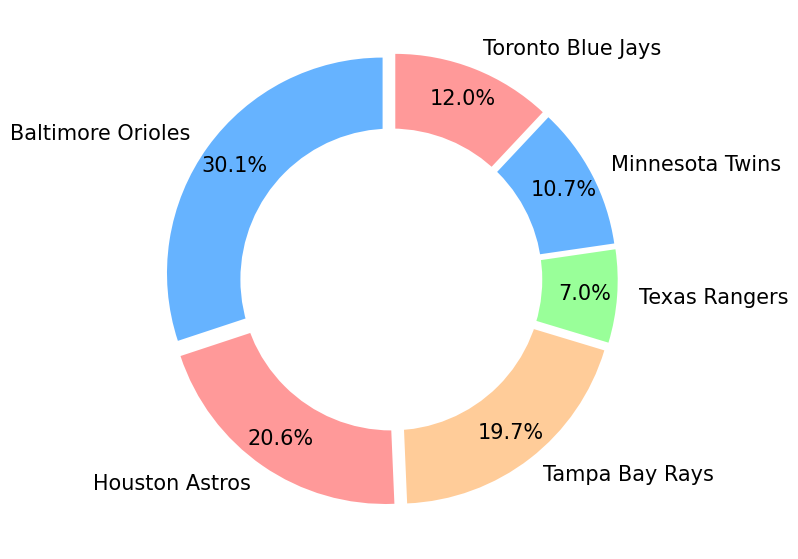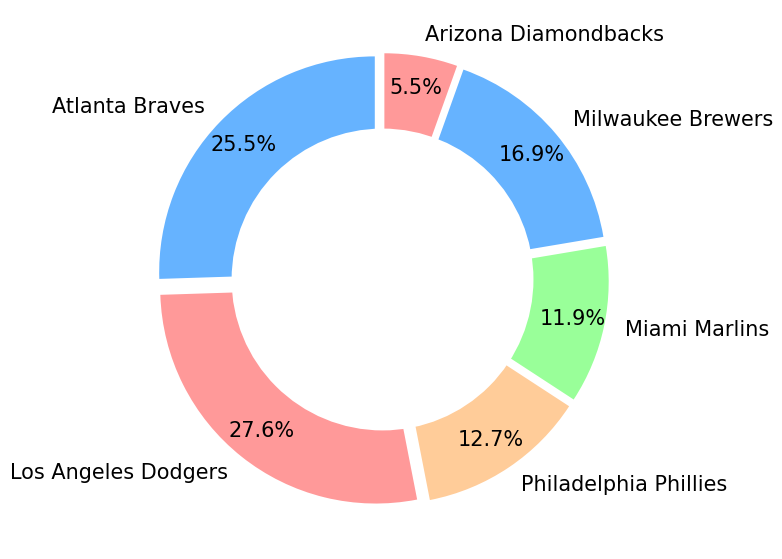Elo ratings¶
The Elo ratings system was initially designed to rank chess players, but has since been used widely in other applications, including many sports. The basic algorithm is reasonably straightforward:
- All teams are assigned an initial score (usually 1500).
- Before two teams play each other, the probability of each team winning is determined by their respective scores:
- If the scores are equal, there is a 50% chance of each time winning.
- Otherwise, the probability is determined from a logistic regression based on the difference between their scores.
- After the result is known, a number of points are transferred from the loser to the winner:
- If the winner was the higher-ranked team, relatively few points are exchanged as the result was expected.
- If the winner was the lower-ranked team, rather more points are exchanged, allowing the rankings to 'self-correct'.
This algorithm is then repeated for every game that takes place. With some thought, it is not too tricky to code this up in Python (other programming languages are available).
Let's take a simple example using the team I support, the San Francisco Giants. After 20 games they had a 7-13 record and an Elo score of 1446 (which we'll call $S_{Giants}$). Their next game was against the New York Mets, who had a rather better 14-8 record and an Elo score of 1546 ($S_{Mets}$). The probability of the Giants winning is then calculated as,
$$ \frac{1}{1+10^{(S_{Mets}-S_{Giants})/400}} $$
which gives a 36% chance (and a corresponding 64% chance of a Mets win). In fact, the Giants took a narrow 5-4 victory in this game. The scores of both teams are then updated based on how likely it was for this result to happen.
$$ S_{Giants}(\mbox{new}) = S_{Giants} + 0.64k $$$$ S_{Mets}(\mbox{new}) = S_{Mets} - 0.64k. $$
The value of $k$ is obviously important here and can be tweaked depending on how sensitive you think the results should be. I take a value of $k=24$ here which seems to work ok, and gives new respective scores of 1461 for the Giants and 1230 for the Mets.
As you can see, then, we could look at any game of our choosing and determine the probabiliy of each team winning based on their past performances. We can also then use the Elo scores to create a ranked list of the teams. While it has no real bearing on anything, for MLB, where teams do not play each other equal times and are divided into 6 different divisions, it is nice to get a sense of who really was the strongest team of the season.
The Elo rankings for the full 2023 season are below, along with the actual games won and win percentage.
|
Name |
Rank |
Games |
GW |
Pct |
| 1 |
Milwaukee Brewers |
1587 |
162 |
92 |
0.568 |
| 2 |
Los Angeles Dodgers |
1586 |
162 |
100 |
0.617 |
| 3 |
Tampa Bay Rays |
1582 |
162 |
99 |
0.611 |
| 4 |
Atlanta Braves |
1581 |
162 |
104 |
0.642 |
| 5 |
Philadelphia Phillies |
1578 |
162 |
90 |
0.556 |
| 6 |
Baltimore Orioles |
1570 |
162 |
101 |
0.623 |
| 7 |
Miami Marlins |
1566 |
161 |
84 |
0.522 |
| 8 |
San Diego Padres |
1565 |
162 |
82 |
0.506 |
| 9 |
Toronto Blue Jays |
1532 |
162 |
89 |
0.549 |
| 10 |
Detroit Tigers |
1523 |
162 |
78 |
0.481 |
| 11 |
Minnesota Twins |
1521 |
162 |
87 |
0.537 |
| 12 |
Pittsburgh Pirates |
1520 |
162 |
76 |
0.469 |
| 13 |
Houston Astros |
1520 |
162 |
90 |
0.556 |
| 14 |
Seattle Mariners |
1516 |
162 |
88 |
0.543 |
| 15 |
New York Yankees |
1515 |
162 |
82 |
0.506 |
| 16 |
New York Mets |
1502 |
161 |
74 |
0.460 |
| 17 |
Texas Rangers |
1495 |
162 |
90 |
0.556 |
| 18 |
Arizona Diamondbacks |
1492 |
162 |
84 |
0.519 |
| 19 |
St. Louis Cardinals |
1486 |
162 |
71 |
0.438 |
| 20 |
Chicago Cubs |
1484 |
162 |
83 |
0.512 |
| 21 |
Cincinnati Reds |
1479 |
162 |
82 |
0.506 |
| 22 |
Washington Nationals |
1470 |
162 |
71 |
0.438 |
| 23 |
Kansas City Royals |
1462 |
162 |
56 |
0.346 |
| 24 |
Cleveland Guardians |
1450 |
162 |
76 |
0.469 |
| 25 |
San Francisco Giants |
1428 |
162 |
79 |
0.488 |
| 26 |
Boston Red Sox |
1420 |
162 |
78 |
0.481 |
| 27 |
Los Angeles Angels |
1413 |
162 |
73 |
0.451 |
| 28 |
Colorado Rockies |
1394 |
162 |
59 |
0.364 |
| 29 |
Oakland Athletics |
1391 |
162 |
50 |
0.309 |
| 30 |
Chicago White Sox |
1357 |
162 |
61 |
0.377 |
There are a number of interesting features here.
Who had the Milwaukee Brewers down as the best team of the season? I mean they did well and won their division, but I didn't see them coming out top. This would suggest they had a relatively tough schedule compared to many other teams. In contrast, the Atlanta Braves with their superb 104-win record are only in 4th, suggesting a relatively easy schedule.
Down at the other end, the much-maligned Oakland Athletics are not the worst ranked team, that dubious honour going to the Chicago White Sox instead (and the Colorado Rockies are only marginally better). Again, this suggests they had a relatively hard schedule to conted with.
The World Series eventually took place between the Rangers and the Diamonbacks. They turn out to be the 17th and 18th best teams according to these rankings, suggesting this was a pretty unlikely match-up.
Before we get too carried away with these insights, it was worth thinking about how accurate they might be. Firstly, the Elo Ratings effectively give greater weight to more recent results, as initially everyone had the same score. As such, a team who beat the Brewers near the start of the season would receive less reward than one who beat them later in the season (although,a team who lost them would receive a greater penalty at the start of the season). Also, these are purely judged on win-loss records, giving us less insight into the effectiveness of the teams' offensive and defensive capabilities.

